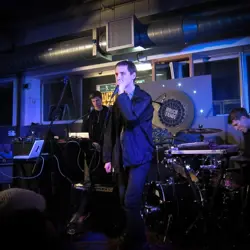 These New Puritans
These New PuritansField Of Reeds is as much a departure from These New Puritans' last album as 2010's Hidden was from 2008's Beat Pyramid. A near-flawless album, Hidden saw the British outfit do away with their art-punk origins in pursuit of an impenetrable, still-unclassifiable hybrid of pummelling electronica, Japanese polyrhythms, post-minimalist classical and fragile post-punk. Field Of Reeds is as different again.
A stark contrast to its predecessor's meticulously maximalist aesthetic, Field Of Reeds is designed around long, amorphous stretches of fragmented sound. Its palette is rooted in the abstract realms of 20th-century classical and early electro-acoustic music. Spiral stretches from rhythmless sheets of brass and children's choirs to quietly duetting reeds and piano. Organ Eternal juggles cascading analogue synth lines with swelling orchestral flourishes, jazz rhythms and rumbling sub-bass.
It's actually a surprisingly affecting listen. Profoundly so, even. Interwoven with the band's experiments, Jack Barnett's fragile, yearning vocal lines lend a painful, human sense of vulnerability to proceedings. As foreign and abstract as the backdrops of pieces like Fragment Two might seem, they're also gut-wrenchingly vital. These New Puritans' experimentation never feels extraneous. Much like Hidden, Field Of Reeds feels like a very clear, considered, deliberate piece of music.
Typically, you'd marvel at how they've managed to equal or surpass their previous landmark album – but that just seems to cheapen both records, in this instance. These New Puritans have made something original, daring and deeply expressive, and suffice to say, you really need to listen to it.
Don't miss a beat with our FREE daily newsletter















